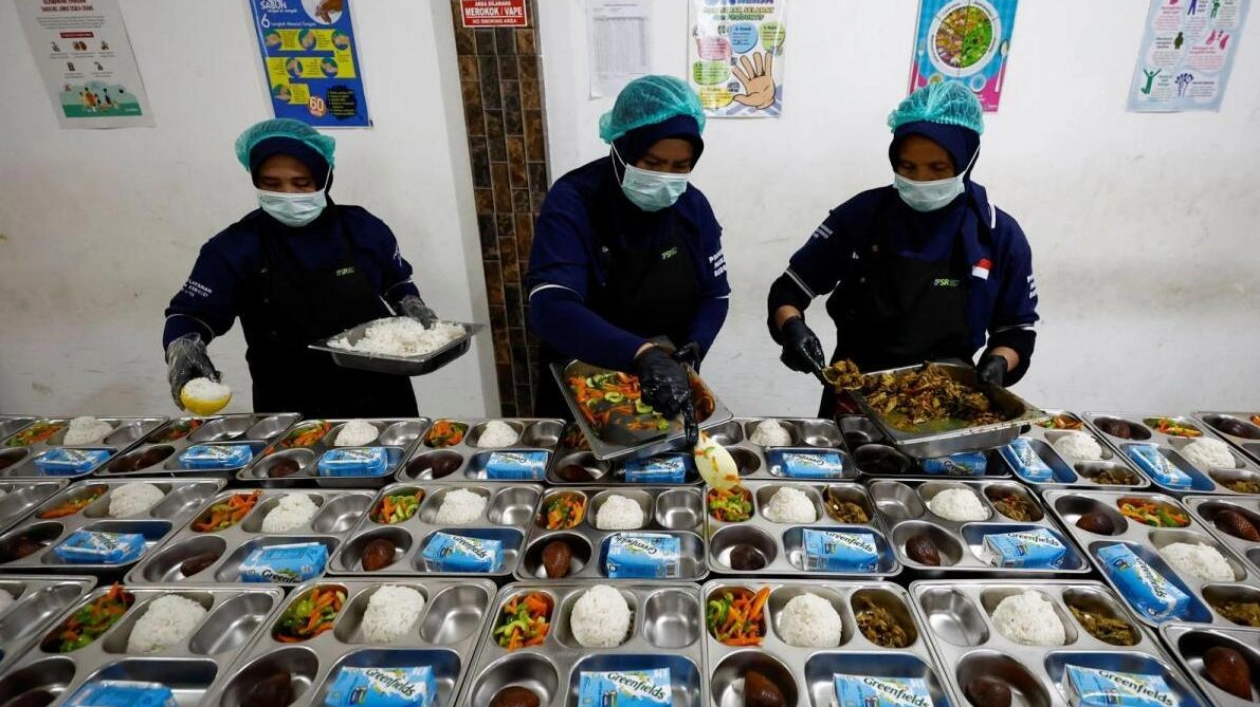Workers are busy preparing meals to be distributed free for students as part of a trial for the free nutritious meals program at a pilot kitchen in Sukabumi, West Java province, Indonesia. — Reuters file
Shakila Fitriyani, an Indonesian sixth-grader and the daughter of a day labourer, dreams of becoming a doctor. She says she is more eager to attend school these days because she receives a free lunch. "I am happy to get the nutritious meal, milk, and fruit," Shakila said in her small home with a tiled roof and bamboo screens in the green highlands of West Java. "This has made me more excited about going to school." Since January, the 11-year-old has been one of thousands of students receiving a midday meal, which includes rice with a spiced, hard-boiled egg, stir-fried vegetables, a box of milk, and a slice of melon. They are part of a pilot program in the province aimed at fulfilling a campaign promise by incoming president Prabowo Subianto, an initiative costing $28 million to provide meals to 83 million children and pregnant women nationwide.
However, the program has drawn criticism from investors and rating agencies, who question how it can be funded without jeopardizing Indonesia's recent hard-won reputation for fiscal prudence. Logistics also pose a challenge in the sprawling archipelago. Prabowo, who will take office on Sunday from incumbent Joko Widodo, asserts that the program is crucial to combat stunting, which affects 21.5% of children under five, and can be implemented within the limits of fiscal prudence. To address budget concerns, Prabowo has capped the first year's expenditure at 71 trillion rupiah ($4.6 billion) to keep the annual fiscal deficit below a legislated ceiling of 3% of GDP. But Eliza Mardian, an economist with the Center of Reform on Economics, warns that the budget might not be sufficient, especially given the high cost of imported milk.
On the other hand, Prabowo views the program as a key driver of economic growth, eventually expected to create an estimated 2.5 million jobs and boost demand for local produce. The president-elect has pledged to accelerate GDP growth to 8% from the current 5%. To ensure the wider meals campaign rolls out by January, Prabowo, currently the defense minister, asked Widodo's administration in August to establish a new National Nutrition Agency, headed by Dadan Hindayana, the chief of his meals program. Initially, 3 million students will receive meals, with the number expected to double by April and reach 15 million by July, with at least 5,000 kitchens to be set up nationwide.
One pilot kitchen in the West Java town of Sukabumi has been operational since the start of this year, employing about 50 people as cooks, food suppliers, drivers, and dish washers to prepare 3,300 meals for 20 schools daily. Kitchen manager Pahmi Idris said activity begins before dawn, with fresh meals made to a menu designed monthly by a certified nutritionist to maximize the use of locally-sourced ingredients, on a budget of 15,000 rupiah per meal. However, the pilot program revealed that convincing children to eat vegetables would be an early challenge, as uneaten vegetables formed the bulk of wasted food.
Indonesia's diverse communities and varied geography could complicate the national rollout of kitchens, according to analyst Izzudin Al Farras Adha of the Jakarta-based Institute for Development of Economics and Finance. Experts also note that better food for school-age children may come too late to address stunting, which requires comprehensive solutions from improved sanitation and hygiene to better nutrition for mothers. Nonetheless, the program's benefits are evident in Sukabumi. Roby Nurdin, a supplier of fruit and vegetables, said the kitchen operation had doubled his income and benefited farmers. More students are attending class, according to Lastri Samtiawati, a teacher at Shakila's school, which receives its meals from the Sukabumi kitchen.






